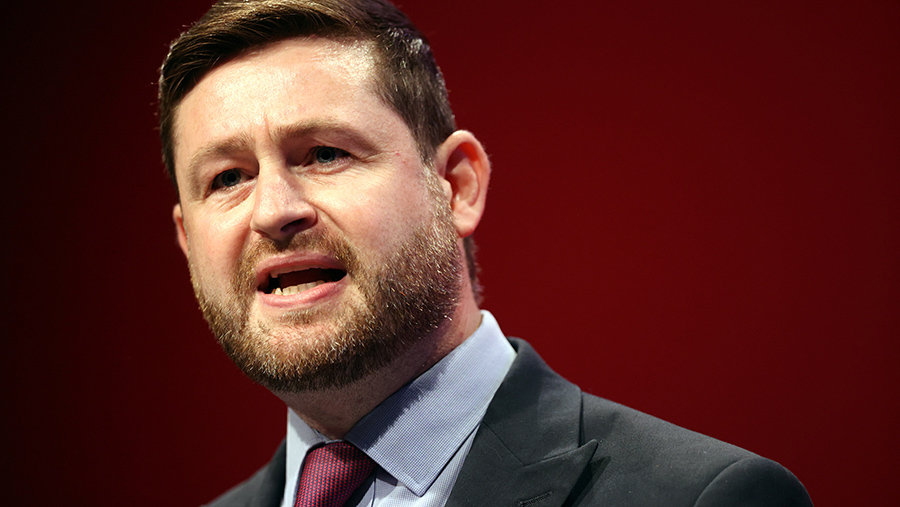Labour backs NFU calls for two-year pause to BPS cuts
 Jim McMahon © Hannah McKay/Adobe Stock
Jim McMahon © Hannah McKay/Adobe Stock Labour has backed NFU calls for the government to pause the phase-out of direct payments for two years to help farmers facing a “perfect storm” of challenges, including the rising cost of fuel, fertiliser and labour.
Farmers across the UK are battling the impact of Covid, Brexit and the war in Ukraine, which has seen fertiliser prices surging towards £1,000/t, the cost of red diesel almost double in a year and fewer migrant workers, especially from eastern Europe, traveling to work on farms.
Shadow Defra secretary Jim McMahon is travelling to a Suffolk beef and dairy farm on Thursday (31 March) to meet farmers and set out the party’s latest proposals for agricultural policy.
See also: Sustainable Farming Incentive 2022: What farmers need to know
A Labour spokesman told Farmers Weekly: “We echo the NFU’s calls for the Conservative government to pause the phased removal of direct payments for two years.
“If Labour were in power, we would do so with immediate effect. Around one-third of all farms would not be sustainable if we removed direct support now.”
Despite the pressures facing farmers, the Conservatives have resisted NFU calls to pause the phased removal of the Basic Payment Scheme (BPS) in England.
Basic payments will be gradually phased out by 2027 and replaced with its new Environmental Land Management (ELM) programme, which will pay farmers for work to enhance the environment.
Crisis meeting
Defra is holding a crisis meeting on Thursday with farming industry bodies, including the NFU, the AHDB, the Country Land and Business Association and the Tenant Farmers Association, to discuss the pressures facing farmers and come up with possible solutions to rising costs of production.
If Labour were in power, it would immediately set up a working group of farmers and food producers, retailers and other key stakeholders in the agri-food supply chain to tackle the current crisis and ensure farms can be financially viable, a party spokesman said.
A Labour government would support farms to make, sell and buy more in Britain. This includes using public procurement to ensure that schools and hospitals buy local produce, encouraging more food to be grown in the region, and across the rest of the country.
According to the NFU, the UK’s current food self-sufficiency rate is hovering at about 60%. Labour has accused the government of being “far too complacent” on food security, saying it would look to increase the UK’s self-sufficiency.
Enshrine high standards
Labour is also backing a private member’s bill, tabled by Tim Farron MP, Liberal Democrat spokesperson for rural affairs, which would require the government’s Trade and Agriculture Commission to assess the impact of any new trade deal on UK farmers and the food industry.
The party would negotiate trade deals that would “promote the UK’s high food standards and would enshrine our food standards to ensure the UK agriculture sector is leading the way around the world on the basis of fair competition”.
Speaking ahead of his visit to Suffolk, Mr McMahon said: “Across the east of England, families and farmers are facing mounting pressures as the cost-of-living crisis takes hold.
“It is vital that we help farmers grow more food in Britain and restore our economy, make work pay fairly, and ensure that everyone can access healthy food produced to the highest standards.”
Defra response
But Defra farm minister Victoria Prentis insisted that abandoning the phase-out of area-based BPS subsidies “would not be the right thing to do”.
She said: “In 2017, £1.775bn of payments were made across 85,000 farms and 10% of claimants received half of this total. Thirty-three per cent of farms received less than £5,000 each. Whilst Labour don’t want to address this inequality, we will.
“Our new schemes are supporting the choices that individuals take for their own holdings, and helping to boost their productivity and profitability. We have recently almost trebled our new Farming Equipment and Technology Fund to over £48m to support more farmers with their investment plans.”
